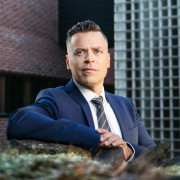The narrative relating to the fence to be built on Finland’s border with Russia is manipulative – and one that has become hegemonic in Finland, says Professor Jussi P. Laine.
A fence on the border creates a false sense of security
Jussi P. Laine started as Professor of Multidisciplinary Border Studies at the University of Eastern Finland in October 2022. At the same time, the project to build a fence on Finland’s eastern border was moving forward rapidly, and the Finnish Government’s supplementary budget proposal included an allocation of 6 million euros for building a test fence.
“Border fences have been studied in different parts of the world for many years, and most studies show, in concrete terms, that fences don’t work – on the contrary.”
Laine criticises the process by which the political decision to build the border fence was rushed through. Research-based knowledge was not used to support decision-making and only one body, namely the Finnish Border Guard, was consulted in the matter.
The debate on the border fence began in Finland in autumn 2021, when Belarus used refugees on its border with Poland as part of a hybrid operation.
“And when Russia started its war of aggression in Ukraine, familiar undertones of fear of Russia began to be heard in the Finnish fence debate. High-level politicians kept repeating that the new, changed security environment was justification enough for the fence project. For citizens, however, the border fence creates a false sense of security.”
Problems related to borders must be identified and acknowledged
Jussi P. Laine is an internationally renowned scholar of mobilities, borders and ontological security. In 2019, he was recognised with the Outstanding Emerging Scholar Award by the Western Social Science Association, WSSA. WSSA is an international association dedicated to advancing multidisciplinary and interdisciplinary scholarship in the field of social sciences.
Border studies caught Laine’s interest already when he was a student in what was known as the University of Joensuu at the time. Critical views of Russia held by Laine’s grandfather, a veteran of war, played a role in why the young student was so fascinated by the country’s eastern border.
“I find it interesting how a narrow line on the map can prevent people from forming their own view of the world, and how it can evoke so many emotions, ideas and passions.”
According to Laine, borders offer simple solutions to complex problems, and it is important to identify and acknowledge the problems associated with them. Europe’s “refugee crisis”, the coronavirus pandemic and Russia’s invasion of Ukraine have shown that borders fail to repel threats, even if they were closed.
“Ultimately, border closures are an indication of insecurity, and in Finland, too, we now see this in the form of concrete debate about building a fence on our border. The fence will not solve any problems, but it does give psychological assurance that someone is doing something about the matter. As a tool for populism, however, the fence is expensive.”
I find it interesting how a narrow line on the map can prevent people from forming their own view of the world, and how it can evoke so many emotions, ideas and passions.
Jussi Laine
Professor
The coronavirus crisis stirred nationalist debates
Laine stresses that there is nothing wrong with borders as such, after all, demarcation is an activity typical of humans. However, problems arise when nationalism gets coupled with demarcation.
“A frequent claim in the immigration debate, for example, is that people come from a certain territorially demarcated region and belong there. If this idea can be challenged, the world would become a much better place.”
In Central Europe, the coronavirus crisis showed how strong a role borders play for people’s identity even today. Laine points out that the border closures weren’t just about the virological disaster.
“Nationalist ideas and Euroscepticism have been brewing under the surface. Before the pandemic, very few mainstream politicians in Central Europe would have had the courage to defend border closures. The acute crisis has passed, but the idea remains, stirring nationalist debates.”
Borders are laboratories for society
In border studies, a major challenge pertains to the scope of the concept itself: borders are studied both as physical phenomena and as demarcation processes. Among other things, researchers are interested in what role borders play, how they draw and define distinctions, and how they are explained and justified.
Laine describes borders as laboratories for society where many societal processes, such as immigration, can be seen earlier and clearer than elsewhere in society. If these processes are detected in time, measures can be taken before problems are felt in society more broadly.
“Borders serve as magnifying glasses, and it is the task of research to highlight any small problems observed.”
Jussi P. Laine
- Professor of Multidisciplinary Border Studies, University of Eastern Finland, 1 October 2022–
- Doctor of Social Sciences, University of Eastern Finland, 2013
- Master of Social Sciences, University of Joensuu, 2006
- Title of Docent in Border Studies, University of Oulu, 2017
Key roles
- Associate Professor of Multidisciplinary Border Studies, University of Eastern Finland, 2016–2022
- Researcher, University of Eastern Finland, 2008–2016
- President of the World Social Science Association, WSSA, 2021–
- President of the Association for Borderlands Studies, ABS, 2020–2021
Photos of Jussi P. Laine:
https://mediabank.uef.fi/A/UEF+Media+Bank/51744?encoding=UTF-8
https://mediabank.uef.fi/A/UEF+Media+Bank/51743?encoding=UTF-8
For further information, please contact:



